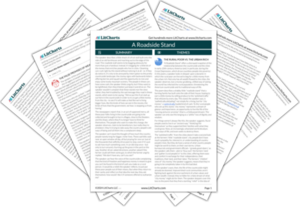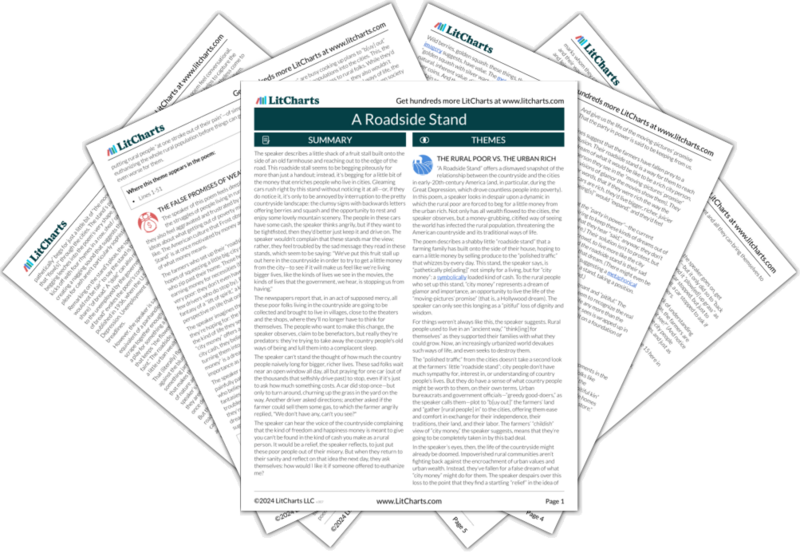A Roadside Stand Summary & Analysis

Download this entire guide to “A Roadside Stand” as a printable PDF. Download this LitChart! (PDF)
Question about this poem?
Have a question about this poem?
Have a specific question about this poem?
Have a specific question about this poem?
Have a specific question about this poem?
A LitCharts expert can help.
A LitCharts expert can help.
A LitCharts expert can help.
A LitCharts expert can help.
A LitCharts expert can help.
Ask a question
Ask a question
Ask a question
In "A Roadside Stand," American poet Robert Frost presents a gloomy view of rural life in the United States during the Great Depression. Observing a sad little "roadside stand" hawking berries and squash to indifferent city people (who just zip past in their cars), the poem's speaker notes that the farmers who run such stands are suffering in more ways than one. They're living in poverty, yes—but they've also been deluded by false dreams of the new life that an infusion of "city money" could give them. Falling for the "moving-pictures' promise" (that is, illusory Hollywood glamor), these farmers lose touch with their traditions and risk assimilation into a selfish urban way of life. Frost first published this poem in the Atlantic in 1936; he collected it that same year in his book A Further Range.

Get the entire guide to “A Roadside Stand” as a printable PDF.
The Full Text of “A Roadside Stand”
The Full Text of “A Roadside Stand”
“A Roadside Stand” Summary
“A Roadside Stand” Themes

The Rural Poor Vs. the Urban Rich

The False Promises of Wealth
- Lines 3-6
- Lines 14-22
- Lines 42-46

The Value of Rural Tradition
Line-by-Line Explanation & Analysis of “A Roadside Stand”
Lines 1-6
The little old .
. and withering faint.




Lines 7-10
The polished traffic .
. S turned wrong




Lines 11-15
Offered for sale .
. and go along.




Lines 16-22
The hurt to .
. keeping from us.




Lines 23-31
It is in .
. the ancient way.




Lines 32-38
Sometimes I feel .
. farmer's prices are.




Lines 39-43
And one did .
. didn't it see?




Lines 44-46
No, in country .
. seems to complain.




Lines 47-51
I can't help .
. of my pain.




“A Roadside Stand” Symbols

The Roadside Stand
- Lines 1-6: “The little old house was out with a little new shed / In front at the edge of the road where the traffic sped, / A roadside stand that too pathetically pled, / It would not be fair to say for a dole of bread, / But for some of the money, the cash, whose flow supports / The flower of cities from sinking and withering faint.”
- Lines 9-13: “the artless paint / Of signs that with N turned wrong and S turned wrong / Offered for sale wild berries in wooden quarts, / Or crook-necked golden squash with silver warts, / Or beauty rest in a beautiful mountain scene.”

The Traffic
- Line 7: “The polished traffic passed with a mind ahead,”
- Lines 36-43: “the squeal of brakes, the sound of a stopping car, / Of all the thousand selfish cars that pass, / Just one to inquire what a farmer's prices are. / And one did stop, but only to plow up grass / In using the yard to back and turn around; / And another to ask the way to where it was bound; / And another to ask could they sell it a gallon of gas. / They couldn't (this crossly): they had none, didn't it see?”
“A Roadside Stand” Poetic Devices & Figurative Language
Juxtaposition




- Lines 1-2: “The little old house was out with a little new shed / In front at the edge of the road where the traffic sped,”
- Lines 7-13: “The polished traffic passed with a mind ahead, / Or if ever aside a moment, then out of sorts / At having the landscape marred with the artless paint / Of signs that with N turned wrong and S turned wrong / Offered for sale wild berries in wooden quarts, / Or crook-necked golden squash with silver warts, / Or beauty rest in a beautiful mountain scene.”
- Lines 18-22: “Here far from the city we make our roadside stand / And ask for some city money to feel in hand / To try if it will not make our being expand, / And give us the life of the moving-pictures' promise / That the party in power is said to be keeping from us.”
Metaphor




- Line 3: “A roadside stand that too pathetically pled,”
- Line 6: “The flower of cities”
- Line 7: “The polished traffic passed with a mind ahead,”
- Line 12: “crook-necked golden squash with silver warts”
- Line 27: “beneficent beasts of prey”
- Line 30: “by teaching them how to sleep they sleep all day”
- Line 46: “so the voice of the country seems to complain”
Repetition




- Line 1: “little old house,” “little new shed”
- Line 10: “N turned wrong,” “S turned wrong”
- Line 15: “(this crossly)”
- Line 30: “sleep,” “sleep”
- Line 31: “sleeping”
- Line 34: “open”
- Line 35: “open”
- Line 43: “this crossly”
- Line 44: “country,” “country”
- Line 46: “country”
- Line 48: “put these people at one stroke out of their pain”
- Line 51: “put me gently out of my pain”
Anaphora




- Line 12: “Or crook-necked golden squash”
- Line 13: “Or beauty rest”
- Line 27: “greedy good-doers, beneficent beasts of prey”
- Line 34: “that lurks”
- Line 35: “That waits”
- Line 36: “the squeal,” “the sound”
- Line 39: “And one”
- Line 41: “And another”
- Line 42: “And another”
Alliteration




- Line 5: “supports”
- Line 6: “cities,” “sinking”
- Line 7: “polished,” “passed”
- Line 11: “wild,” “wooden”
- Line 12: “squash,” “silver,” “warts”
- Line 14: “money,” “mean”
- Line 21: “pictures,” “promise”
- Line 22: “party,” “power”
- Line 27: “greedy good-doers,” “beneficent beasts”
- Line 36: “squeal,” “sound,” “stopping”
- Line 42: “gallon,” “gas”
- Line 46: “country,” “complain”
- Line 48: “put,” “people,” “pain”
- Line 51: “put,” “pain”
“A Roadside Stand” Vocabulary
- Pled
- Dole
- Marred
- Artless paint
- Mean
- This crossly
- Why keep your money
- The moving-pictures
- Kin
- Beneficent
- Requisite life of spirit
(Location in poem: Line 3: “A roadside stand that too pathetically pled”)
Form, Meter, & Rhyme Scheme of “A Roadside Stand”
Form
Meter
Rhyme Scheme
“A Roadside Stand” Speaker
“A Roadside Stand” Setting
Literary and Historical Context of “A Roadside Stand”
More “A Roadside Stand” Resources
External Resources
- A Brief Biography — Learn more about Frost's life and work.
- Frost's Home — Visit the website of the Robert Frost Farm, a museum housed in one of Frost's former homes, to learn more about the poet's life.
- The Great Depression — Learn more about the Great Depression, the massive economic crisis that was in full swing when Frost published "A Roadside Stand" in 1936.
- An Interview with Frost — Listen to a recorded conversation between Frost and his fellow poet Randall Jerell.
LitCharts on Other Poems by Robert Frost
- Acquainted with the Night
- After Apple-Picking
- Birches
- Desert Places
- Design
- Dust of Snow
- Fire and Ice
- Home Burial
- Mending Wall
- Mowing
- My November Guest
- Nothing Gold Can Stay
- Out, Out—
- Stopping by Woods on a Snowy Evening
- The Death of the Hired Man
- The Oven Bird
- The Road Not Taken
- The Sound of the Trees
- The Tuft of Flowers
- The Wood-Pile
Cite This Page
Definition
A Roadside Stand
Full Text
Lines 3-4
It gathers to a greatness, like the ooze of oil Crushed
Get instant explanations to your questions about anything we cover.
Powered by LitCharts content and AI.
Copyright © 2024 All Rights Reserved
Save time. Stress less.
AI Tools for on-demand study help and teaching prep.
 Quote explanations, with page numbers, for over 44,148 quotes.
Quote explanations, with page numbers, for over 44,148 quotes.
 PDF downloads of all 1,994 LitCharts guides.
PDF downloads of all 1,994 LitCharts guides.
 Expert analysis to take your reading to the next level.
Expert analysis to take your reading to the next level.
 Advanced search to help you find exactly what you're looking for.
Advanced search to help you find exactly what you're looking for.
 Expert analysis to take your reading to the next level.
Expert analysis to take your reading to the next level. Advanced search to help you find exactly what you're looking for.
Advanced search to help you find exactly what you're looking for.

































































 Quote explanations, with page numbers, for over 44,148 quotes.
Quote explanations, with page numbers, for over 44,148 quotes. PDF downloads of all 1,994 LitCharts guides.
PDF downloads of all 1,994 LitCharts guides. Expert analysis to take your reading to the next level.
Expert analysis to take your reading to the next level. Advanced search to help you find exactly what you're looking for.
Advanced search to help you find exactly what you're looking for.
 Expert analysis to take your reading to the next level.
Expert analysis to take your reading to the next level. Advanced search to help you find exactly what you're looking for.
Advanced search to help you find exactly what you're looking for.